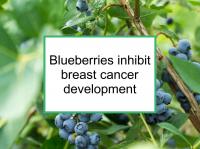Blueberries have been shown to inhibit both hormone receptor positive (ER+/PR+) and hormone receptor negative (ER-/PR-) breast cancer. Blueberries contain numerous compounds with reported anti-cancer properties, among them pterostilbene, resveratrol, ursolic acid and several anthocyanins.
Blueberries have been found to inhibit mammary cancer cell proliferation in mice and rats, as well as inhibiting cultured cancer cell growth in the laboratory and blood vessel tumors in rats.
Latest research finds blueberry reduces tumor formation & growth
The study referenced at the beginning of this news story was designed to investigate the effects of a blueberry-supplemented diet in an animal model of breast cancer. The authors demonstrated in previous studies that blueberry-supplemented diets protected against estrogen (E2: 17β-estradiol)-sensitive mammary tumor formation in ACI rats.
In the present study, the authors examined both the preventive and therapeutic effects of a diet supplemented with a whole blueberry powder with high-anthocyanin content. The animals were divided into two groups (prevention or treatment), plus a group of controls that did not receive any blueberry powder.
Rats in the prevention group received a 5% blueberry diet two weeks before E2 treatment (treatment that stimulates mammary tumor growth). Rats in the treatment group received the 5% blueberry diet 12 weeks after E2 treatment (at which point microscopic mammary tumors were already established in the animals).
In the prevention group, the blueberry diet increased the period before the appearance of palpable mammary tumors by 28 days. In the treatment group, the blueberry diet caused a 37-day delay. Both blueberry diet groups also had significantly lower tumor volume and number than the control group. Further analysis demonstrated that these effects on mammary tumorigenesis were caused by favorable genetic changes in the cancer cells. The authors conclude that whole blueberry is effective in inhibiting E2-mediated mammary tumorigenesis in both preventive and therapeutic modes.
Please see our articles on blueberries and what ER+/PR+ breast cancer patients and survivors should eat for more information.
